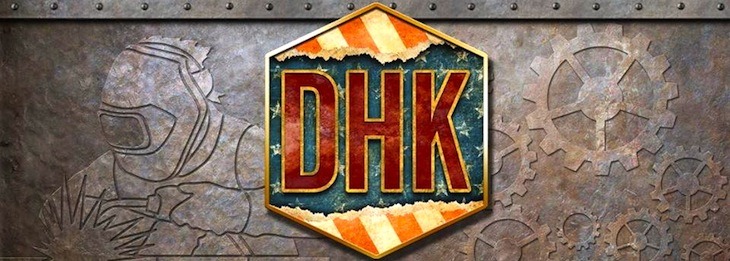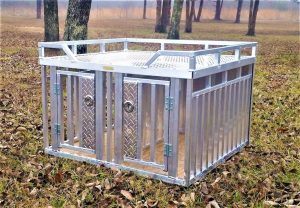Small business reinvents itself through social media, helps mother recover from the loss of her son
by March 28, 2017 11:58 am 2,351 views

Heath Rhodes decided a free giveaway on social media was the best way to spur his hunter dog box business, DHK Manufacturing. The specialty boxes made by his company can cost anywhere from $350 per unit, and can climb up to $1,500. Hundreds entered the contest and told their stories of woe.
One story in particular tore at his soul. An Aragon, Ga., woman lost her son when a drunk driver killed him three years ago. Phyllis Newberry didn’t win the free dog box contest, but Rhodes and several others drove to her home Monday to give her other son a free dog box, he told Talk Business & Politics.
“There are a bunch of people pulling up in my yard … I have to go,” she said to a Talk Business & Politics reporter as the delivery was being made. “Oh, my gosh.”
Rhodes, and his grandparents, Norwood and Pat Crouch, began the business in 1994 in the town of Wheeling, in Arkansas’ rural Fulton County. Hunters often buy boxes to transport their hunting dogs on trips, Rhodes said. The boxes keep the animals safe in the back of a truck and keep them out of the elements, he said. The initial box was called the “Buddy Box.”
The main problem with their burgeoning business was that they had to hire welders to complete the aluminum-based boxes, and it was hard for the business to flourish, he said. During his college years, Rhodes took a welding certification class and would drive back and forth from Jonesboro to Wheeling to help his grandfather with the boxes.
Rhodes took several management jobs through the years, working as manager at Bill’s Fresh Market, and as a preacher, but he always made time for the boxes. More than two years ago, he and a new partner, Jon Hatley, decided to take the business to the next level. They promote their business exclusively on social media. The company had grown to five employees, and they almost never meet their customers, he said. Boxes are sold nationwide, but most are sold in Arkansas, Texas, Mississippi, and Alabama.

The dog box market is hard to determine, Rhodes said. He estimates sales can climb up to $10 million, annually if the economy is good, he said. During profitable months, his business can generate $10,000 per month in receipts. Dog boxes are a niche market, but have a dependable customer base, he said. Hunting dogs can cost as much as $10,000, and hunters want to take care of them, he said.
Bear, hog, and large game hunters tend to be younger, and it’s a key demographic for them. Coyote, coon, and other smaller game are hunted by all ages, but those hunters tend to be older. The physical requirements seem to be a determining factor, he said.
“Some guys spend more on their hunting dogs than they do on their own wife,” he said with a laugh.
The contest was started several months ago as a way to promote their products, Rhodes said. People would submit stories as to why they, a friend, or a loved one deserved a free dog box. Harrowing stories poured in. Rhodes spent many nights reading the hundreds of comments, stories, and private messages. They decided to narrow it to 10 finalists, and the one who received the most likes on Facebook was the winner.
“How could we pick which heart wrenching story pulled more at the heartstrings? There was no way a good guy with a conscience could ever make that choice. We decided to let the people decide it,” Rhodes said.
Jared Workman, a paraplegic bear hunter from Utah won the contest. Rhodes said his ability to overcome his physical limitations made him a worthy choice. Before he was chosen, several of Workman’s friends said they wanted to buy a box and give it to him, and a company offered to ship it for free.
“If that guy (Workman) can overcome that, what can’t he do?” Rhodes said. “What excuses do the rest of us have?”
As it was becoming obvious that Workman would win the contest, something startling occurred, Rhodes said. The other finalists started donating their “likes” to Newberry. Her story gripped them, he said.
Newberry, her husband, and sons, Jacob and Kyle started coon hunting when the boys were young, she said. The two boys would beg to accompany their parents and anyone else who headed into the woods, she said. As Jacob and Kyle grew older, the brothers often hunted together. Jacob, the older brother was driving home from work when a drunk-driver struck and killed him – three years, eight months and 15 days ago, Newberry said with an ache in her voice.
Kyle gave up hunting. He sold his equipment. To help him cope, Newberry thought Kyle needed to return to the woods he and his brother used to share. Rhodes, his wife, Kelli, Hatley, and others spent several hours with the Newberry family Monday night. They shared a meal and stories.
“I’m not going to lie … this started off as a promotion for our business. It became so much more than that,” he said.
